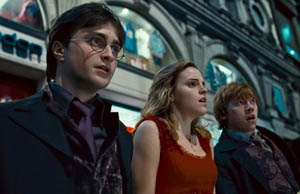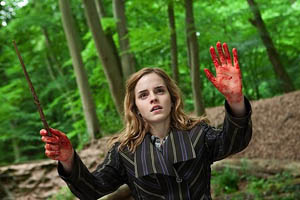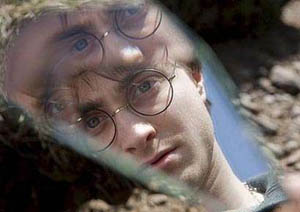|
To say that this is not your father's Harry Potter would inadvertantly give the reverse impression, so I shall invert the popular aphorism and say instead that this is not your kids' Harry Potter. Looking at this film and trying to conceive that it's part of the same continuity as the whiz-bang, gee-whiz Sorcerer's Stone could give your brain a hernia. 
Following the murder of wizard mentor Dumbledore, a lonely pall has been cast above the land our characters inhabit, one which rarely breaks. An early action scene, in which Harry is escorted to the home of the Weasleys amid a furious attack by Voldemort and his followers, establishes the heightened stakes of the game-unlike most first-act conflicts, the battle is not without consequences. The film resolutely avoids settling into comfort; the enemy is on the move, and has infiltrated the government. The issue of purity, first raised back in Chamber of Secrets, looms above the quickening corruption of society, with anti-muggle propaganda and enforced tests of heritage becoming the order of the day. Non-magically inclined persons or those of mixed blood are subjected to mock trials under the auspices of the odious Undersecretary Dolores Umbridge, a culturally-specific icon if ever there was one-only a Brit would envision a pink-coiffed school marm with a stick up her ass as the ultimate image of bureacratic evil. And for the first time, Harry faces the consequences of having virtually all of his support structure stripped away; with virtually none of his schoolteachers or adult confidants available to help (and many not even appearing), he has only his two best friends to rely upon, and even that will be sorely tested long before the film is over. 
The promotional machine would have you believe that this is an adrenaline-packed action rush of a film. It isn't. It is, for long stretches, one of the most eerily quiet films in recent memory. Director David Yates makes us feel the weight of inaction, the tension lurking inside the passage of time in the sorts of seqences rarely seen outside of a Sergio Leone western, with tiny, helpless figures dwarfed by the immensity of landscape. The age group who thrilled at Potter's earlier adventures will likely find this tedious. This isn't a story about sleuthing with childhood pals, but an often stark film about loneliness and bleak despair. Ron Weasley spends much of the film's somber middle act with his ear pressed to the radio as he, Harry and Hermione live in exile, desperate for news of his family's fate. With the new regime abducting undesireables and the ranks of the missing rising day by day, one almost expects to hear the stomp of goose-stepping jackboots coming up the walk. One of the film's key sequences shows Yates' flair for visual invention, as Hermione reads an old tale which may have a bearing on the events of the present. Exactly the sort of exposition-laden scene that could easily have become boring to sit through, it instead is realized as the most visually striking scene of the entire series, with cleverly-utilized 3D animation sketching in the story as it is told. One can't help but wish that Yates had come to the series earlier, though it's simultaneously true that it might well have not seen such success had things begun so darkly. 
Even with spending two-and-a-half hours covering just the first half of book seven, there is still an unfortunate sense of vagary pervading many things. If one has never read the books, which I've not, then even a refresher course of the previous six films will still leave you wondering on many events herein. Harry is often seen staring into a piece of broken mirror he's brought along, which has never been seen in any prior film and which also goes unexplained in this one. There's also the fact that one character's ultimate fate is muted in effectiveness by his absence from any filmed versions in a half-dozen years or so. Following the significant revelations of Half-Blood Prince, the scheming Severus Snape gets disappointingly little to do, and dammit, Brendan Gleeson gets short-changed on screen time yet again, especially since by far the bulk of his appearance was spent playing an imposter of his actual character. I said at the end of my Half-Blood Prince review that the next film had better dispense with build-up and get on with the action, and yet, while that didn't happen, what did happen is so unusual and unexpected from a series like this that I really didn't mind. Seeing what often amounted to a European art film where I expected to see a Harry Potter movie was about the last thing I expected going in, and I like the surprise. The approach is bound to be divisive, but that's hardly my problem, after all. -review by Matt Murray
|
|
||||||||